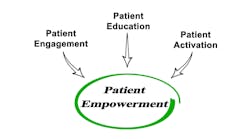NYHealth Grants Support Open Notes Movement at Smaller Providers
The New York Health Foundation (NYHealth), a private, statewide foundation, has awarded nearly $800,000 in grants to 14 non-hospital systems to help them deploy the concept of sharing open notes with their patients.
The 21st Century Cures Act requires healthcare providers to make clinical notes available to patients electronically and at no charge. However, the level of compliance and, most importantly, the proactive use of open notes to improve care vary among health systems, the foundation notes.
NYHealth said it has long supported the spread of open notes throughout New York State. Most recently, in response to the federal mandate, NYHealth supported a cohort of 16 hospitals to go from good to great in their note-sharing and associated patient engagement.
In parallel, in 2022, NYHealth issued a Request for Proposals (RFP) to support federally qualified health centers (FQHCs), physician practices, and other non-hospital systems across New York State in similarly deepening their efforts to share visit notes with patients. This initiative is designed to help non-hospital systems—key providers of primary care and other services for marginalized communities—comply with the recent federal rules and use open notes to engage patients more meaningfully. The program lies at the intersection of NYHealth’s former Empowering Health Care Consumers priority area and its new Primary Care priority area.
NYHealth, in partnership with the OpenNotes national program office at Beth Israel Deaconess Medical Center in Boston, is providing the 14 non-hospital systems selected through this RFP with funding, technical assistance, and peer-learning opportunities to share open notes with patients.
The systems selected for awards and participation in technical assistance represent nearly all regions of the state and various types of primary care providers. These systems serve marginalized patient populations, including people of color, people with low income, immigrants and refugees, non-English speakers, LGBTQ youth, homebound older adults, individuals experiencing homelessness, and individuals with intellectual/developmental disabilities.
Grant recipients are:
• Advantage Care Health Centers
• Anthony L. Jordan Health Center
• BMS Family Health and Wellness Centers (Brownsville Community Development Corporation)
• Doctors United
• Jericho Road Community Health Center
• La Casa de Salud
• Mosaic Health
• Parker Jewish Institute for Health Care and Rehabilitation
• Saratoga Community Health Center
• St. John’s Medical Group (Episcopal Health Services)
• Syracuse Community Health
• The Door – A Center of Alternatives
• Union Community Health Center
• VIP Community Services
NYHealth also awarded a grant to the Beth Israel Deaconess Medical Center to provide technical assistance to the 14 systems as they undertake their projects.
The OpenNotes office recently named Om Lala, M.D., M.B.A., M.Phil., as its first chief innovation officer to lead strategic efforts to expand the impact of open notes and to articulate a vision for the future of transparency in healthcare.
“I’m thrilled to join OpenNotes at such an exciting time in history,” said Lala, in a statement. As the healthcare industry increasingly navigates advancements in AI and health policy that mandates further transparency, I think we’re uniquely positioned to help society harness the immense benefits that come with people having easier access to their medical records.”
Prior to joining OpenNotes in Boston, Lala led the effort to bring open notes to New York City Health + Hospitals, the largest safety net hospital system in the U.S., serving 1.4 million patients. His method of measuring a successful implementation of open notes—and deploying principles from behavioral economics to increase patient engagement—was featured in NEJM Catalyst as a model for other health systems.


